In recent years, client portals have emerged as a new category of business software. These secure, branded interfaces allow clients to log in, view shared files, track tasks, send messages, and interact with service providers in a centralized, professional environment.
At the same time, CRMs (Customer Relationship Management systems) have long been essential tools for managing leads, contacts, deals, and client communication. So it’s no surprise that CRMs are beginning to incorporate built-in client portals—especially for service-based businesses, agencies, and B2B providers that need to keep clients informed and engaged beyond just sales and support.
By combining CRM functionality with a secure client portal, businesses can streamline operations, reduce friction in communication, and deliver a more professional, branded experience to their clients—all in one place.
What to Look for in a CRM with a Client Portal
Choosing a CRM with a built-in client portal means looking beyond just contact management or sales automation. The best solutions offer tools to actually support ongoing client relationships.
Custom branding and white-label options
A client portal should reflect your brand, not the software’s. Look for CRMs that offer logo customization, custom domains, email branding, and even full white-label options.
File sharing and communication tools
Clients should be able to securely view and upload files, send messages, and possibly even chat within the portal—no more scattered email threads or missing attachments.
Task tracking and collaboration features
Task assignments, progress updates, and shared calendars allow your team and your clients to stay aligned throughout the project lifecycle.
Secure login/authentication
Client portals must offer reliable authentication with secure login options such as SSO, 2FA, or at least encrypted credentials.
Integration with other business tools
Whether you use Google Workspace, Slack, or project management tools, look for a CRM that integrates with your existing stack to avoid siloed data and redundant work.
Top 7 CRMs with Built-In Client Portals
1. Ahsuite
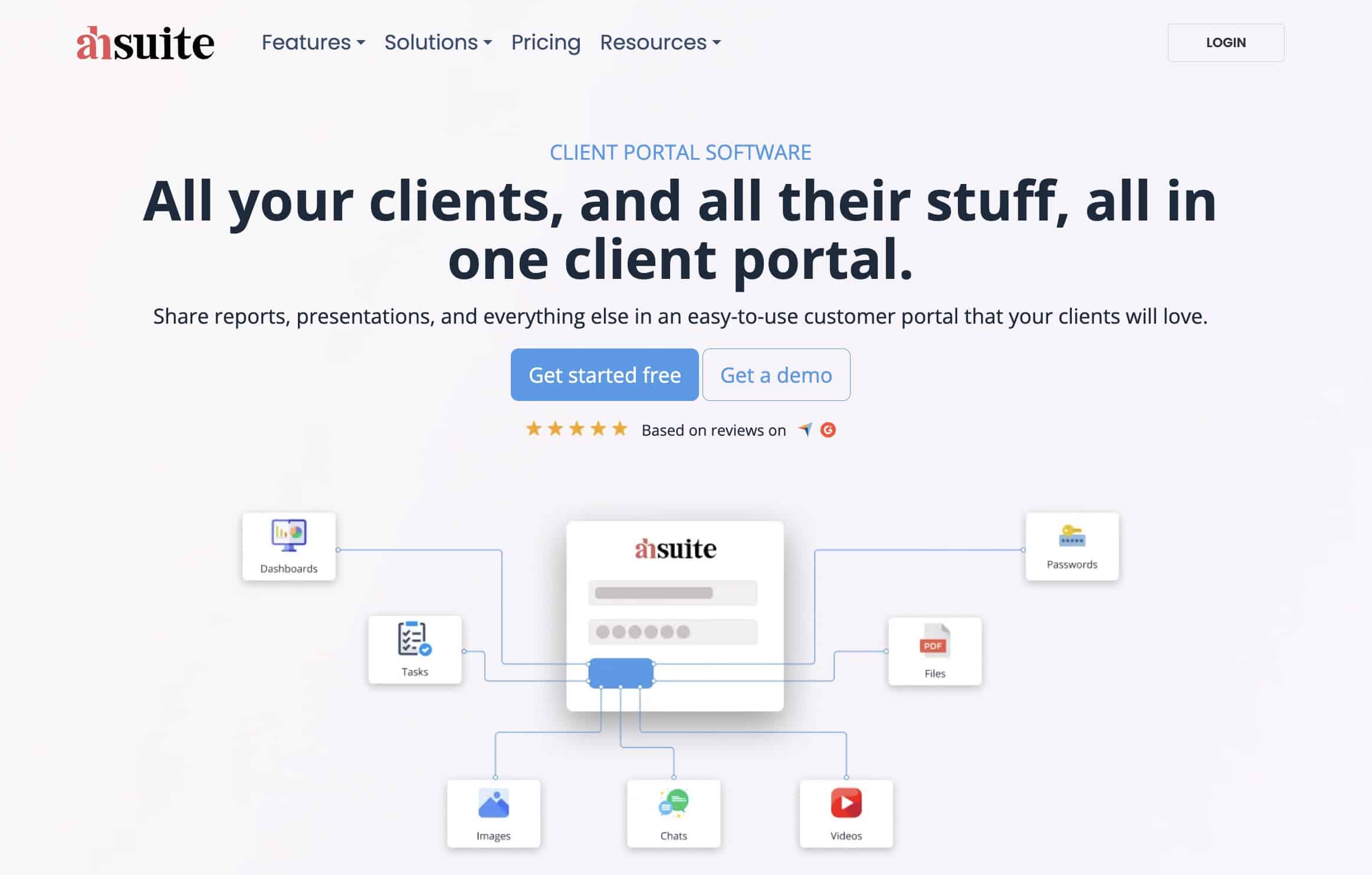
Ahsuite is a client portal tool designed specifically for professionals who work closely with clients—such as consultants, agencies, accountants, and freelancers. While not a traditional CRM, Ahsuite includes core client management features and is ideal for service providers looking for a clean, focused client experience.
Key Features:
- Branded client portals with custom domains and email addresses (Agency plan)
- Task management and project collaboration
- File sharing and embedded content
- Team password manager
- Secure authentication with optional portal passwords
- Free for up to ten portals
Pros:
- Extremely clean and intuitive interface
- Quick to set up and easy for clients to use
- Affordable with a generous free tier
- Personalized support from the founder
Cons:
- Not a full-featured CRM (no lead scoring, campaign tracking, etc.)
- Limited automation compared to larger platforms
Ideal For: Agencies and service providers who want a simple, secure portal to manage client work and communication.
2. FuseBase (Formerly Nimbus)
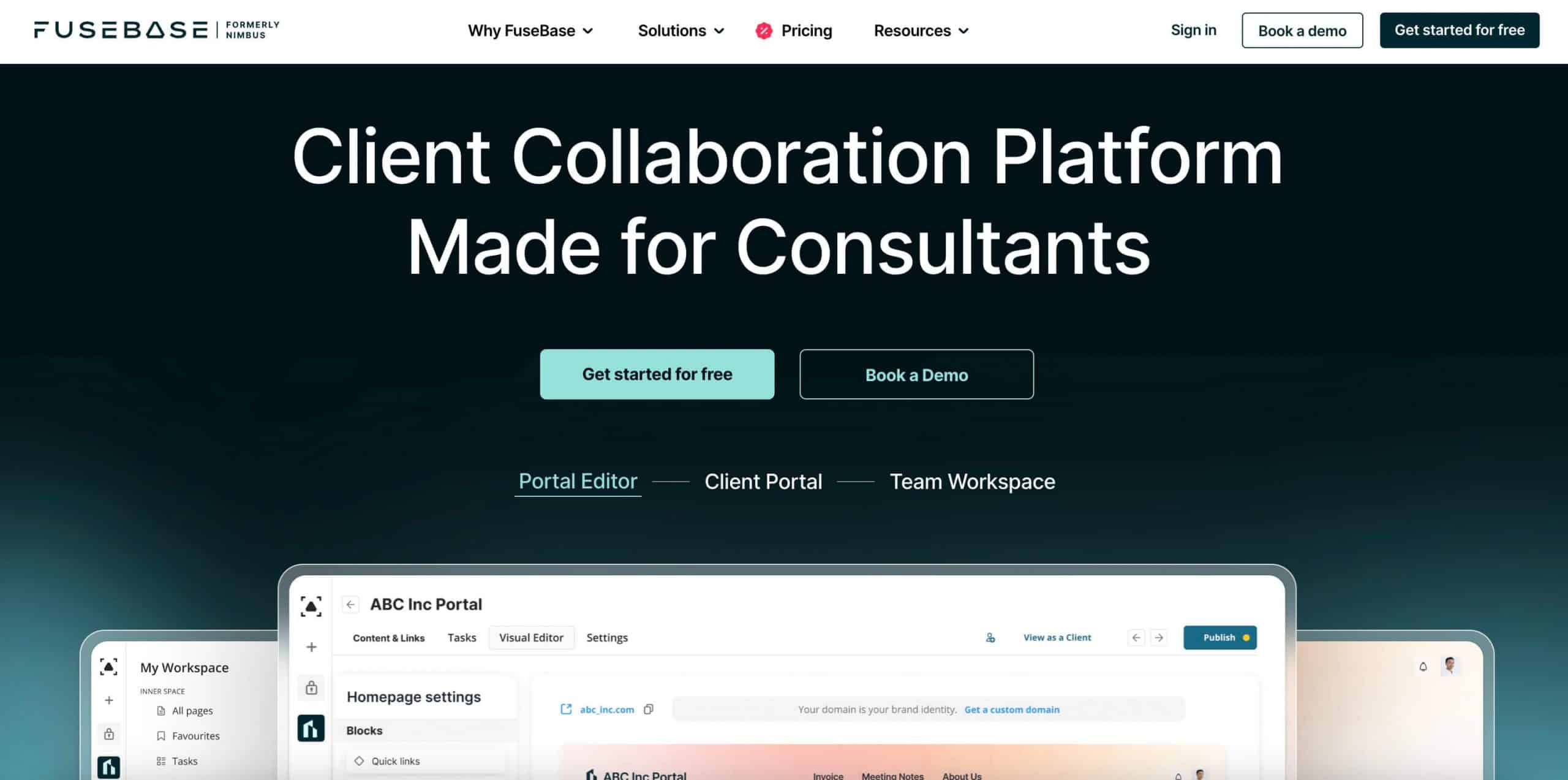
FuseBase, formerly known as Nimbus, is an all-in-one platform for both internal and external collaboration. It merges client-facing portals with internal project management tools to facilitate every stage of a project. The platform is designed for knowledge-driven businesses and offers white-label client portals and a robust back office.
Key Features:
- Centralized Project Workspace: Consolidates all project-related communication, documents, and tasks into a single platform for collaboration.
- Streamlined Client Onboarding: Offers personalized onboarding experiences for clients.
- Intelligent Project Assistance: Utilizes AI to manage organizational details, allowing teams to stay focused on progress.
- Knowledge Base: Facilitates the development of a comprehensive knowledge base for ongoing learning and information sharing within an organization.
- Data Collection: Allows for the sharing of customizable forms with clients to gather necessary data for insights and results.
Pros:
- Combines internal team and external client collaboration in one tool.
- Offers white-labeling for a branded client experience.
- Includes AI-powered assistance to help manage projects.
- Supports integrations with existing systems to improve workflows.
Cons:
- May be more focused on document and knowledge management than complex CRM functionalities.
Ideal For: Knowledge-driven, client-facing businesses that need a unified platform for project management, client collaboration, and information sharing.
3. SuiteDash
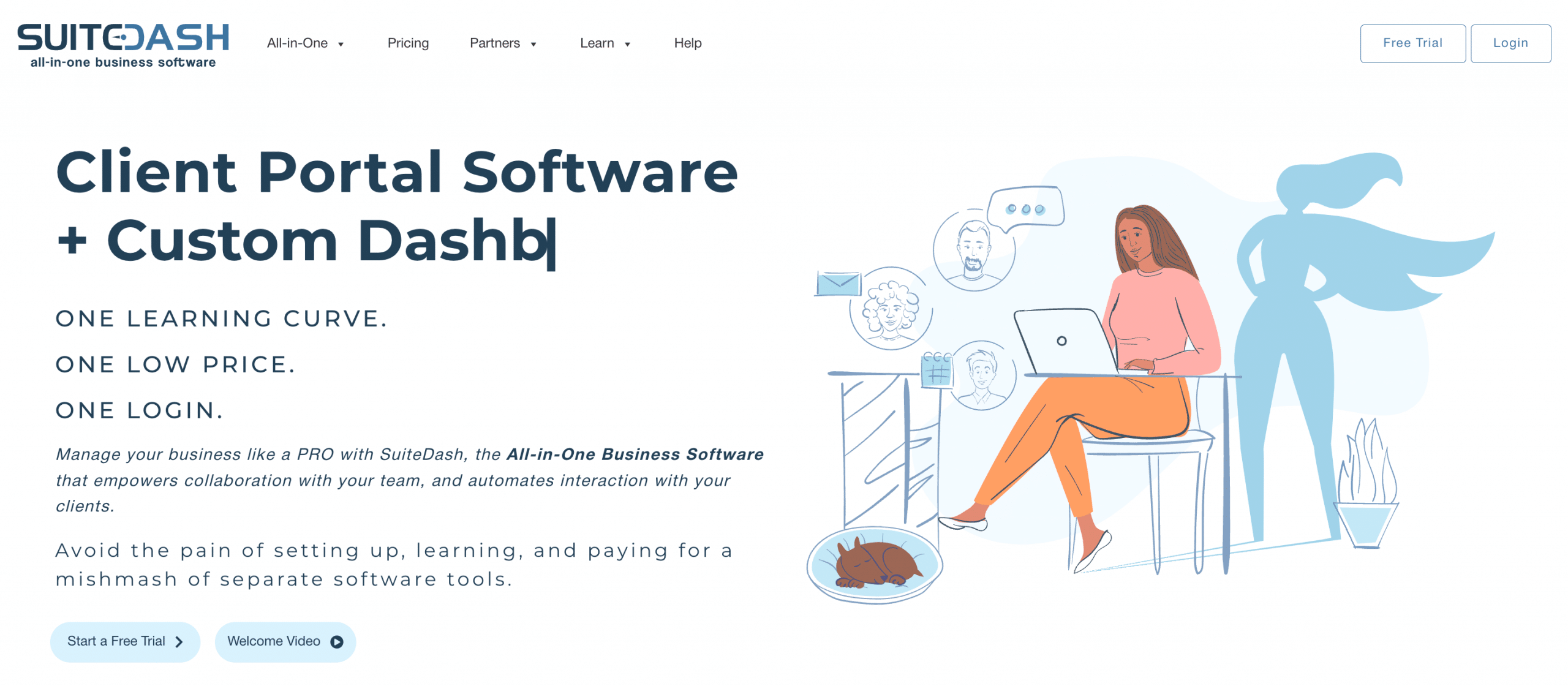
SuiteDash brands itself as the “Swiss Army Knife” of business software, offering an all-in-one platform designed for small to medium-sized businesses. It consolidates numerous business tools into a single, pre-integrated system to streamline and automate processes, particularly client interactions.
Key Features:
- Automated CRM: Centralizes client and staff information, automates workflows, and manages relationships.
- Client Portal: Provides clients with a secure, self-service portal for file sharing, communication, and progress updates.
- White-Labeling: Allows businesses to fully customize the platform with their own branding, including a custom URL and a white-labeled mobile app.
- Comprehensive Toolset: Includes features for appointment scheduling, project management, invoicing, e-signatures, and email marketing.
- Unlimited Model: Offers unlimited clients and staff members without increasing the subscription cost.
Pros:
- Extensive set of integrated tools eliminates the need for multiple “one-trick pony” software.
- Highly customizable with extreme white-labeling options.
- Predictable pricing with an unlimited user and client model.
- HIPAA-compliant, making it suitable for industries with strict privacy requirements.
Cons:
- The sheer number of features might be overwhelming for businesses with very simple needs.
Ideal For: Small to medium-sized businesses looking for a comprehensive, all-in-one platform to manage all aspects of their operations and client interactions under their own brand.
Related: What is SuiteDash?
4. Moxo
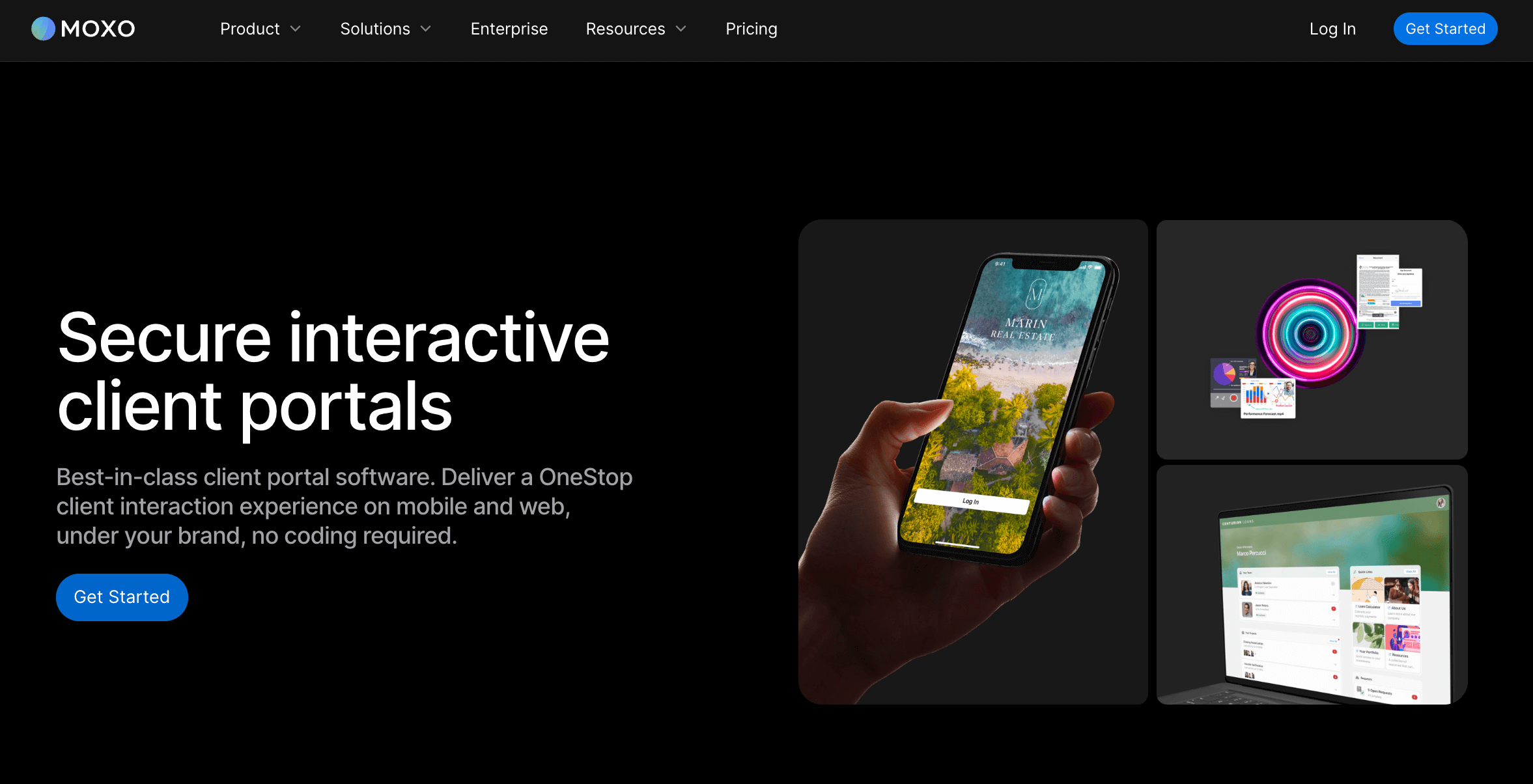
Moxo is built to orchestrate human-driven workflows, with a strong focus on client engagement and automation. It provides customizable, role-based client portals for collaboration across departments and organizations. Moxo excels in industries like financial services, consulting, and real estate.
Key Features:
- Role-based branded portals on web and mobile
- Embedded workflow builder for high-trust, repeatable processes
- Intelligent system integrations with CRMs, ERPs, and other business tools
- Adaptable AI assistance for routine tasks
- Full audit trail, alerts, and progress tracking
Pros:
- Ideal for complex, multi-step processes
- Great for client onboarding and service delivery
- Strong white-labeling and mobile capabilities
- Industry-specific workflow templates
Cons:
- May be overkill for small teams or simpler use cases
- Pricing not clearly listed—likely enterprise-focused
Ideal For: Enterprises and process-heavy businesses that need structured workflows across internal and client-facing teams.
Related: What is Moxo?
5. Zendesk
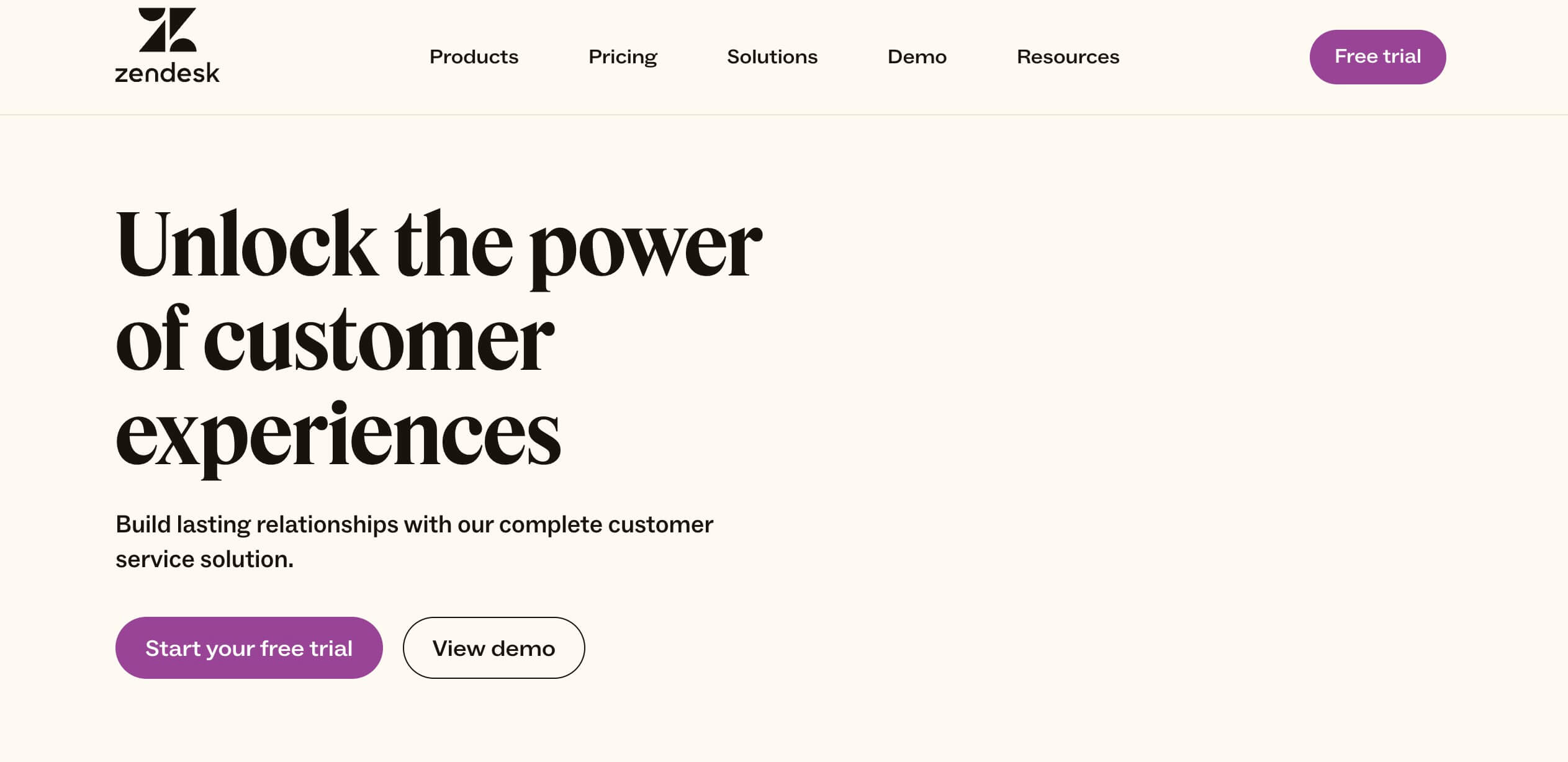
Zendesk Sell is part of the broader Zendesk ecosystem, offering a modern, sales-focused CRM with pipeline visibility and productivity tools. While known more for support and ticketing, Zendesk also supports client collaboration through shared workflows and contextual customer data.
Key Features:
- Contact and deal management with activity tracking
- Advanced sales automation and pipeline analytics
- Unified view across sales and support
- Mobile app with full CRM functionality
- Integration with Zendesk Support and third-party tools
Pros:
- Intuitive and easy to use
- Powerful analytics and reporting tools
- Fast onboarding and simple setup
- Seamless tie-in with support systems
Cons:
- Limited native client portal functionality—better for internal use
- More focused on sales teams than ongoing service delivery
Ideal For: Sales teams looking to unify customer conversations across marketing, sales, and support in one streamlined platform.
Related: What is Zendesk?
6. Zoho CRM
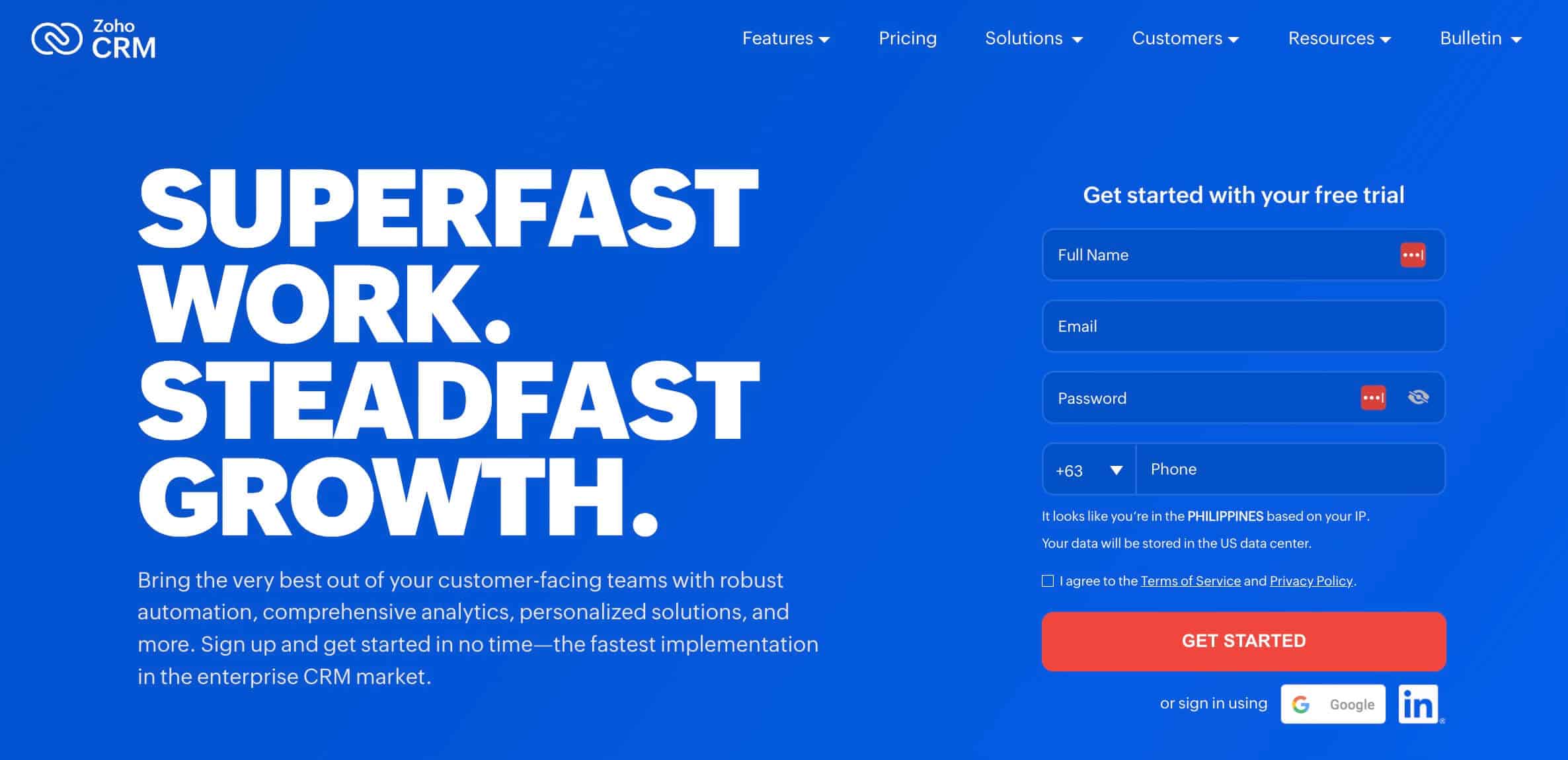
Zoho CRM is a feature-rich platform used by businesses of all sizes. Known for its affordability and depth, it includes advanced tools for sales force automation, journey orchestration, and contextual AI. While it doesn’t have a dedicated client portal module, it can be extended and customized to create customer-facing experiences.
Key Features:
- Sales force automation and journey orchestration
- 360° customer view and contextual AI
- Advanced analytics and pipeline management
- Integrations with Zoho apps and third-party tools
- Scalable with customizable modules
Pros:
- Affordable with a free trial and flexible plans
- Highly customizable
- Good integrations within the Zoho ecosystem
- Strong focus on security and compliance
Cons:
- Interface can feel overwhelming for new users
- Client portal experience requires configuration or third-party add-ons
Ideal For: Small to medium-sized businesses looking for a full-featured CRM with the flexibility to extend into client-facing capabilities.
7. Salesforce Sales Cloud
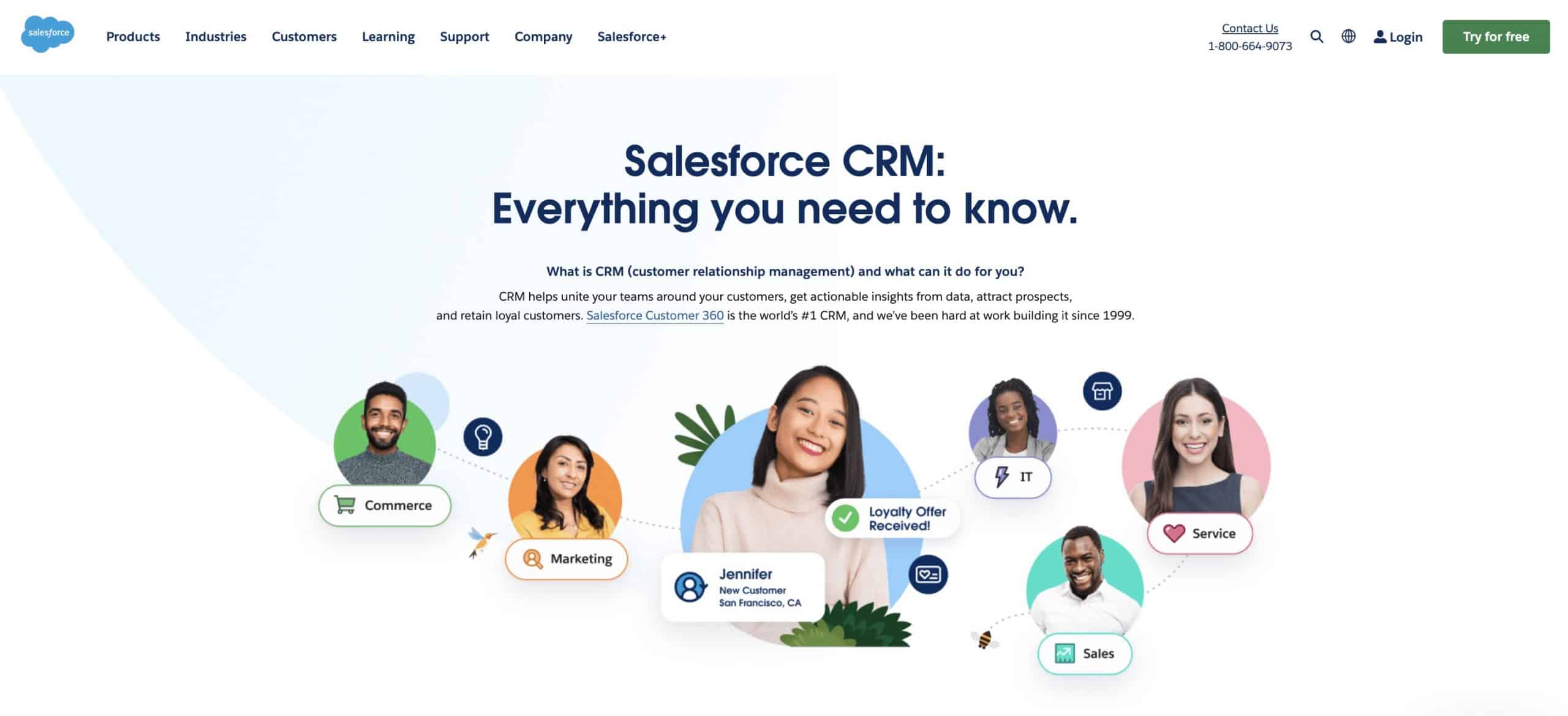
Salesforce Sales Cloud is a component of the world’s #1 AI CRM, designed to help sales teams sell faster and more efficiently. It integrates sales, service, marketing, commerce, and IT on a single platform to provide a shared view of every customer, enabling more personalized experiences.
Key Features:
- AI-Powered CRM: Utilizes Einstein AI to provide predictive, generative, and conversational AI capabilities across the platform.
- Comprehensive Sales Tools: Includes features for lead management, forecasting, and closing deals.
- 360-Degree Customer View: Consolidates data from every interaction to give employees a holistic view of the customer.
- Customization and Scalability: Offers solutions tailored to specific industries and business sizes, from small businesses to large enterprises.
- Integration: Built for integration with other applications, allowing data to be shared across internal and external systems.
Pros:
- Industry-leading AI capabilities to boost productivity and personalization.
- Highly scalable and customizable for businesses of all sizes and industries.
- Unites various departments with a single, shared view of the customer.
- Strong ecosystem of third-party apps and integrations available through AppExchange.
Cons:
- Can be complex to set up and may require dedicated resources for customization and maintenance.
- Pricing can be higher compared to other solutions, especially for enterprise-level features.
Ideal For:
Businesses of all sizes, from startups to large enterprises, that require a powerful, scalable, and AI-driven CRM to manage and enhance their sales processes and customer relationships.
Try Ahsuite
CRMs with client portals represent the next evolution in client service—especially for businesses that rely on high-touch, ongoing relationships. While the tools in this list vary widely in scope and complexity, each one offers a glimpse into how CRMs are adapting to support modern client engagement.
If you’re looking for a streamlined, secure, and easy-to-use client portal that includes tasks, file sharing, and custom branding, Ahsuite is a great place to start. It’s free for up to ten client portals, and offers a powerful yet simple experience for both teams and clients.
FAQs About CRM with Client Portals
What is the benefit of a client portal in a CRM?
A client portal makes it easier to communicate, share documents, and manage work with clients—without relying on endless email threads. It centralizes everything in one place.
What industries benefit most from CRM client portals?
Agencies, consultants, accountants, lawyers, and B2B service providers all benefit—especially those with ongoing client relationships.
Is there a free CRM with a client portal?
Yes. Ahsuite offers a free plan for up to ten client portals, and includes core CRM and collaboration features.
